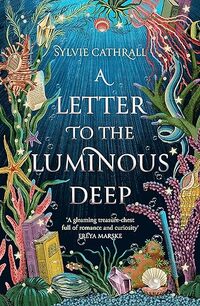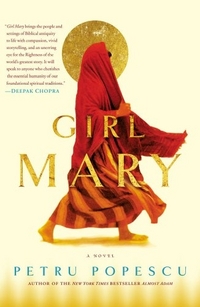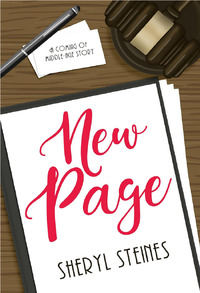 A LETTER TO THE LUMINOUS DEEP |
 April's Affections and Intrigues: Love and Mystery Bloom |

Purchase
Simon & Schuster Inspirational, Historical Excerpt of Girl Mary by Petru PopescuHe spurred his horse, which pulled behind it another horse, loaded with water skins and bales of hay. Five nights in a row, the young Roman, king Herod’s envoy, had chosen a campsite in the desert, poured water from the skins into a bucket and watered the horses, then broken hay and spread it on a tarp of flax before them. He ate heavy barley bread and ripe cheese and figs. Then he tied the horses’ front legs two palms above their ankles, as if handcuffed. If they spooked and took off during the night, the hooves’ banging on the sand would awake him. When jackals approached, the horses whinnied and awoke the envoy, who bolted and waved his arms and shouted until the jackals withdrew. He lay back to sleep. When the dawn cracked the dark open, he was in his saddle already, horse leading horse. Every day he rode the horse he’d spared the day before. The sunlight scalded his face. His cape fluttered behind him, like an angry flame billowing off his shoulders. Scanning with narrowed eyes the shadows of the dunes, and riding against them, east. On the third day of riding, bones started cracking under his racing hooves. Skulls, hidden under shallow sand, exploded under his passage like catapult shots. The man stopped the horses, jumped off his saddle, and hunkered down. He dug the ground with his ornate Roman pugio. In instants, the short heavy sword revealed more skulls, with hair still clinging, mixed with shreds of striped fabric -- the dead had been wearing tallits, male headscarves. The still intact hair was dark. Those slaughtered men were young. The Roman grinned at the desert’s fiery air: he was on the right course. He would find the Jews of the Desert, and there would be enough of them to bring back. Hope swelled inside him. He got on his horse and rode on. Ahead of the Roman man, hour after hour, the desert dried up more. It looked like a moon face, as in that old tale whispered before the writing of the Torah: God made the earth, fertile and wet he made it. Then, just to play, God made the moon, but it came out barren. God slammed it to the ground, where it broke into a thousand shards. God made another moon: again, it came out barren. God flipped it with the back of his hand, off into the sky: hover up there, and light up the humans’ nights, or what good are you? Obeying God’s wish, the second moon shone silently in the sky. And the first moon, God let its shards mix with the earth, and they became the earth’s deserts. The envoy knew many stories of the Jews, even some not written in books. In just a few months before sailing from Italy, he had learned so much about God’s chosen people. Across that shattered moon, he rode until he glimpsed palm trees. The oasis was no mirage. Had he not found it, he might have lost his way, using up his supplies until he died in the desert. But here he was. The water wheel was moved by a capstan, whose bars were pushed by girls walking in a circle, like donkeys toiling on a farm. Clay pots tied on the rim of the wheel brought up the clear flow, emptying it into in a cistern large enough to water a caravan. The Roman counted the desert girls: eight, in wet robes of unfitted flax, treading that muddy rut. Small and malnourished, they urged each other with brief guttural cries. As the Roman hissed, tss-tss, to slow down his horse, one girl jumped onto the wheel and walked inside it, like a hamster inside a toy. Amused, the Roman stared at the camp beyond. A jumble of tents patched with rags. Rock walls, bee-hived with puffing holes. They live in those holes, he marveled. That smoke is from cooking pots. The girl in the wheel started to run. The spokes creaked, the pots splashed onto the other workers. The impatient girl beat the hair off her face with a tanned hand. Cries of “stop,” “slow down,” made her run faster -- until the visitor sat up in his saddle and called out: “The rabbi, who is the rabbi here?” The girls stopped pushing the capstan. Halting abruptly, the wheel threw out the prankster – she flew to the ground, landing by the visitor’s horse. Dizzied, she looked straight at him. Ite me dei, the man swore softly in Latin, so help me, gods! – I’ve seen her before! Though he knew he had not. But since for five days he’d seen only barren sands and the flanks of his horses, maybe she reminded him of all that was nurturing and feminine. She was tall. Wearing the istomukhvia, the all purpose shirt of flax of women from Galilee, old and worn-out, likely handed down from her mother. Behind her shirt, he guessed a body without one ounce of fat. He took in her face. So baked by the sun, it had the tint of ripe carobs. Freckles dotted the sides of her small straight nose, a few above each delicate nostril. Her eyes seemed lilac in shade, but when she stood up against the late sunlight, her eyes were brown. When she spoke, he felt that he knew her voice. “My father’s the rabbi here, and who are you to ask?” “I am an envoy with a message from your king.” The tall one called out: “Orpa!” to a girl even darker and wirier. The one named Orpa nodded, then both of them whistled, while the other girls pulled out the capstan’s ribs – in a blink, these children were armed with bats. The Roman’s hand went to his sword, but he caught himself. Easy, he thought. The lips of the freckled girl were thin, but so finely drawn. “What’s your name?” he asked her. His voice, thank the gods, was calm. “Mary-amneh,” she replied, a little defiant. But the Roman guessed that she blushed, as her skin started to shine under that tan. A shadow drew close: a jackal, low-bodied, brightly fanged. Followed by three more. The Roman gasped: tame jackals! One jackal put up its muzzle, and the girl stroked it. Were they trained to attack? If they jumped him, he’d be easy prey… Seized by fear, he blurted: “Herod the Great sends word to the tribe of Joachim ben Ahaz ben Mathan… Are you his tribe?” The brown-eyed girl nodded. “The king forgives you all! You’re no longer in exile, you can return to your homes in Nazareth!” They gaped at him. The silence dripped with the water from those pots. Then Mary-amneh threw her head back. She gave a high ululated call, like a desert bird. There was a rush of voices, from people lunging out of tents and caves. The Roman jumped off his horse. Dizzy. He’d been in the saddle since dawn. A crowd was hurrying over. Older men and women, boys with fuzz on their upper lips, a gaggle of children. They wore old clothes, discolored from use and washing; only one tall gray-haired woman wore an apron smeared with bright color stains – that’s the girl’s mother, and she’s a dyer, the Roman remembered. The mother did not look much like Mary-amneh except for her height, but the bearded man running next to her had the girl’s nose, her thin expressive lips, her freckles even. Casus patris certi, unquestionably her father by blood, Apella thought, silently enjoying the Roman words. He was lonely for home. He spoke Latin to other Roman soldiers in Jerusalem, mostly when they banded together to visit a whorehouse outside the walls, in the Kidron valley. The pale old man and his wife surged at the fore of the crowd. Here they are, he thought, Joachim, and Anna. He was informed of these people’s names, and alert for anything they would say – speculator vigilans semper, a spy is forever at work. He glanced back. By the cistern, the girl pulled a hair slide from some fold of her shift, and forked it against her rich hair. The crowd yammered in Aramaic, with harsh khh sounds, as if spit boiled in their throats. How many of them had survived king Herod’s wrath, fifty, eighty? He remembered those skulls in the desert, cracking under his passage. The tribe’s young males had all been killed, but some boys had been spared – he spotted them in the crowd now, grown, with fuzz under their noses. But who had fathered these wailing infants? The visiting camel drivers? I’ll find the answers to all those questions, he told himself, while rabbi Joachim, pale, his beard grainy white, stopped right in front of him and gazed at him suspiciously. Civil, the Roman said: “My name is Apella, special servant to the king, you may have guessed that I’m not Judean, nor Galilean, though I speak your language and know your customs. The king’s message is, you can return to Nazareth, as of right now.” Joachim and his wife looked at each other, the crowd looked at each other. It seemed that this message, once so desired, was coming too late. Then Joachim asked: “You have a writ from the king, bearing out your words?” “Of course.” He lunged to the stamping horses, unbuttoned a leather holster and pulled out the king’s scroll, tearing the bone clasp that sealed it. Joachim lifted his arms. When his sleeves fell back, Apella cringed: Joachim’s hands had been beaten severely. Fingers knobby and crooked as if they healed broken, nails missing, he gestured with one maimed hand that the wife should hold up the scroll before his eyes, then he read like a learned man, quick, without glancing twice at a word, and shook his head. “It says here that we’ve been amnestied, but of what offense? We were never tried in a court.” Apella shrugged. “It’s the king’s will that you return to your homes. You should take advantage of his generosity.” Joachim turned to his daughter: “Mary-amneh?” The name was common in Galileee. King Herod’s late wife, his one Jewish spouse among a harem of ten, was also called Mary-amneh. Herod’s other wives were Greek or Phoenician. But queen Mary-amneh was Jewish and the king’s favorite, until the king had killed her in a drunken fit of jealosy. Allegedly, she had stared out of her window at a young captain of the guards. Herod has snuffed her with a pillow. He had also killed Aristobolus and Alexander, the two sons she bore him. Everyone knew about Herod’s crimes, but Herod was kept on his throne by the Romans precisely because he was cruel. That made him an optimus rex socius, an excellent client king, and client kings did the will of Rome all around the world. The girl named after the murdered queen stepped closer to her father. Joachim whispered to her. She nodded, and whistled again. Now a dozen jackals scurried out of the bushes, and two of the water girls ran leading them up the path, back into the desert. Good, Apella thought. They would scour the dunes and find that I’ve come alone. After that, they will trust me. The girls particularly must be dying to leave this hole. Mary-amneh turned to the cistern, scooped water in her palms, and washed her face. Apella stepped up. “I’d be thankful to wash too.” She grabbed her shift, wiped her forehead and cheeks, then swung her bare arm at the cistern: be my guest. She wasn’t going to pour water, or wait on him with a towel. You un-scrubbed brat, who needs your favors, he grumbled under his breath, dunking his hands and forearms, then his face. Flies and wasps floated where she had rippled the water. He splashed them away, noticing that the cistern was built of freshly fitted planks. Wood was expensive in Galilee, earmarked for Roman ships; trading with the caravans, the Jews of the desert had done well. He was thirsty, but fearful to drink where camels drank. But the girl had just washed her face in the cistern. To hell with it. He drank with long gulps. He stood up, stocky, his hair short and curly, his eyes piercingly brown, his nose strong, prow-like. Handsome, he rated himself. “Mind the flies,” Mary said. A cloud of them rose from the rippling water. He peeled off his subucula, his vest, revealing a gut swollen from eating barley bread, and slapped the flies away. The girls tittered. Having just turned twenty-five, Apella had never felt old or unfit in front of females. Scowling, he pulled his vest back on. “Has the king arranged for our homes to be returned to us?” Mary asked. “When we were chased here, the clan of Shalafta and the clan of Aaron stole our homes, our herds, all we owned.” Apella frowned as if he first heard about that; but he knew about those clans. “They joined the king’s Syrians, to drive us to our deaths -- our own cousins. If we go back, they’ll jump us and kill us.” “They won’t. I’ll stop in Nazareth on my way back, and convey the king’s wish.” He turned to Anna, “You dye clothes, yes? My mother was a dyer too. Dyers pass their secret recipes to their children, yes?” She nodded curtly. He pointed to a purple stain on her apron: “I thought purple could only be drawn from Red Sea shells.” “That’s true, but the caravans bring us shells,” said Anna. “And we get colors from desert flowers, crushed with water.” He beamed at her: “You people made the well into a good business, you’ll know how to bargain for your houses.” “Sweet-talking, aren’t you?” said the girl Orpa, surprising him with her daring. “Tell the king to give us our homes back, otherwise this is meaningless.” And everyone yelled: “Our homes, yes! Amen! Amen!” Amen. That word which the Jews used so often and with such passion – it really meant “I believe.” The Romans felt excluded when they heard the Jews say it. Some Romans belched or farted when they heard it. “What do you know about us?” Joachim asked. And the crowd became deeply silent, eyes drilling the stranger. Apella answered softly: “Only what I heard at the court. I’ve been in the king’s pay only a year. When you people still lived in Nazareth, the king’s oldest son, Aristobolus, hired you, rabbi, to build him a prayer chest, yes? You were renowned as a carpenter, yes?” Joachim nodded, suspicious but flattered. “But Aristobolus was scheming to seize his father’s throne, so the king had him killed. Then he banished everyone who knew the prince, including your tribe, rabbi Joachim, and that’s all I know. After prince Aristobolus was killed, queen Mary-amneh drowned herself in the palace pool, but before she did that, she sent a letter to Rome, telling emperor Augustus that her husband had gone insane and Augustus should remove him from the throne…” “The king was always insane!” someone yelled. “He’s like the lame old lion who eats his cubs!” “Why are you serving the king?” a teenager shouted, cocking his scrawny neck at the well-fed visitor. “What’s your name?” Apella asked. The boy cleared his voice. “Shimon,” he muttered, less hotly. “I’m a soldier of fortune, Shimon. A good one too, as long as the kings pays me, and that makes the king less suspicious.” “Less crazy, less rabid!” many voices shouted. “Maybe so,” Apella replied. “But just now, the king’s in a tight spot. He’s old and sick, and must rein in his sons by his youngest queen, Malthace the Phoenician. So he hired new servants, me included, to put a new face on his rule. And I told him, your majesty, you have too many discontents. Pardon the Jews of the Desert, write the scroll, I’ll take it to them…” Joachim’s cheeks surged red: “You told him to do that?” “Yes, that was my suggestion. He agreed so easily, maybe the conjunction of the stars two months ago was unusually favorable… “ “Two months!” the crowd marveled. “I’m sorry it took that long. The king keeps me busy.” “It’s not like Herod to forgive,” an older man shouted. “This is a trap.” “Then it’s your choice to stay here,” Apella said. “But I give you the word of the urbs of Rome, I’m not putting you in harm’s way! I am a vigil Asiae, a supervisor of these lands, it’s my duty to maintain peace here. The king is sixty-nine and his memory’s slipping. I don’t think he remembered who you were, when he signed the scroll.” “So, we’ll go home and no one will harm us?” “Yes. You have nothing to fear.” The people banded on Apella. The closest ones touched his vest and his tunic of platelets, while the children scurried to paw his boots. Dizzied by so many breaths and odors, he yelled: “It is as I said, amen!” I believe from the lips of a Roman made them laugh, and he laughed with them. “If you start on your way back tomorrow, I’ll get a writ for your homes too, and we’ll meet outside Nazareth’s gates.” “We can’t leave tomorrow, we must decide what to do with the well,” Mary said. Her father nodded: “Yes, the lives of travelers and their animals depend on our water.” The daughter’s the key, Apella concluded. If she trusts me, everyone will. I must try to speak with her alone. He gave her a quick bow: “Show me around, so I can tell whoever asks how you survived here. You could use some friends.” She was silent, though she undoubtedly heard him. “Mary, don’t waste this chance. Don’t you want to go home?” He smiled at the other girls, folding his arms crib-like, lullabying an imaginary baby: “Girls, don’t you want to get married, have children, know the pleasures of neshikot ve reerim (little kisses and slobbers)?” The girls laughed, all except the tall one. She leaned toward him, and whispered: “Why did you lie about the queen’s death?” “Huh?” The sun stabbed between two trees. He raised his hands to shade his eyes. She whispered again: “Or maybe you didn’t know?” “Know what?” He turned to avoid the glare, right into her eyes. “The king killed Mary-amneh before he killed Aristobolus. So Aristobolus wanted to avenge his mother, he told me that when he came to Nazareth to see my father’s work. If he failed, he knew that his father would kill him. It was just a matter of who would be quicker.” Apella gaped, without faking: “He said that to you alone?” “No, he said it at my father’s dinner table, for everyone to hear. He was drunk. Before the night was over, the king raided Nazareth. I saw him kill Aristobolus, while his Syrians whipped us out of our homes, and into the desert.” Her words conjured images of torture and murder – meantime there was something about her that was so peacefully female, the arc of her lips, the appeal of her still unripe body. Apella knew that the caravan masters called her betoola, meaning an unopened young woman, a virgin, with the special emphasis Jews put on virginity. But prince Aristobolus had been a terror with women, seducing so many of them, then forsaking them all. In the time he had spent in Nazareth, had Aristobolus tried to seduce the rabbi’s daughter? Molliter, molliter (gently, gently), I’ll find out all those answers. The girl stood on tiptoe, turning toward the desert: the tamed jackals were trotting back. Behind them, tired, walked the two water girls. The jackals plunged into the crowd to be petted, drooling cheerfully: they’d found no hidden killers in the desert. Mary turned to Apella and smiled: “Lucky for you, you didn’t lie about coming here alone. I’ll show you the camp.” Excerpt from Girl Mary by Petru Popescu |
|
| |||
|
||||



 © 2003-2024
© 2003-2024